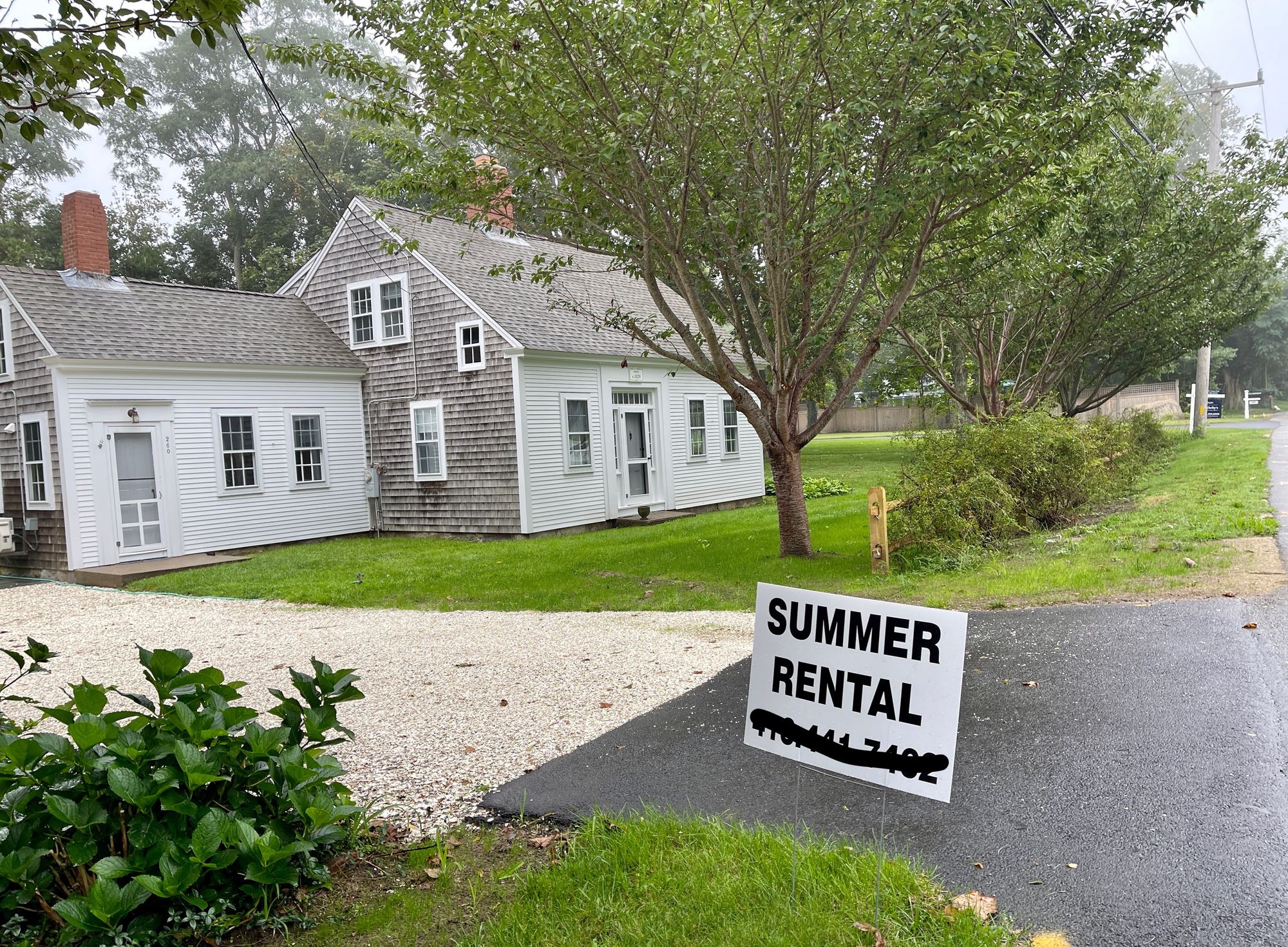The time must come when this coast will be a place of resort for those New-Englanders who really wish to visit the sea-side…
– Henry David Thoreau, Cape Cod (1865)
Like all Cape towns, Orleans runs on summer visitors. Tourism has kept the town alive and humming for at least the last century, since the whaling, fish-packing and salt works industries collapsed and Cape Cod was reinvented as a seaside resort. By the early 1900s, there were rooms to rent by the night at resort hotels and inns in Orleans, like the long-defunct Southward Inn, and boarding houses and cottages to rent by the week.
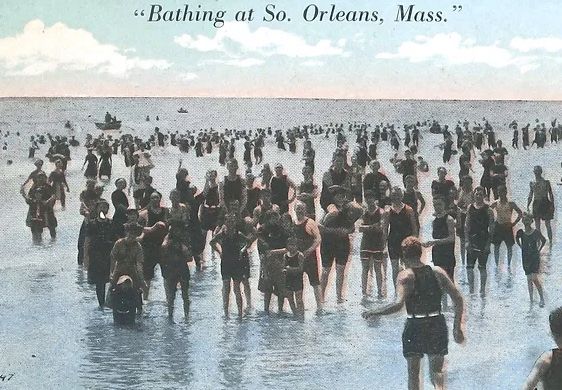
Fast forward to 2023 and, despite all the technological changes that make booking a humble cottage or waterfront estate so easy online, not much has changed in terms of how our town gets by, economically. Carp all you want about loud parties, lines at the grocery store, or not being able to turn left, seasonal visitors are our bread and butter, our meat and potatoes, our lifeblood.
What has changed?
Where they stay.
Today, Short-term Rentals (STRs) are by far the most popular way for vacationers to enjoy the Cape. This means many Orleans property owners are also landlords — and that STRs are a major force in our economy, and in our neighborhoods. Their growing numbers, size, and price tags are drawing attention, questions and concern.
What does the growth of STRs mean for the future of Orleans — our economy, our natural environment, our soul? How can we encourage this key component of our economy while we protect the fabric of our neighborhoods and preserve our quiet rural charm? What are other Cape towns — and resort towns elsewhere — doing?
In this deep dive, EXIT 89 will answer these questions — and more.
Renting: A Cape Cod Tradition
For decades, many year-round families have supplemented their incomes by renting out rooms in their homes, or the whole house, in the summer. In many cases, summer rental income can pay the mortgage for the rest of the year, even if it means pitching a tent or parking a camper for a couple of weeks at Nickerson State Park, moving in with family or friends, or even staying on a boat for the season.
For second-home owners — many of whom hope to retire in Orleans eventually — it can mean renting out their Cape house for most of the summer and saving a few weeks in summer or the shoulder season for their own use. In the past, homeowners either paid a manager or listing agent to rent the house out for them, or they did it themselves by advertising their houses in the classifieds pages of newspapers and magazines, or relying on word of mouth and renters who would return year after year.
Obviously, the online revolution has turned the rentals game on its head. Easy options for finding tenants — or someone to manage the entire process for you — abound. You can rent your home yourself through Craigslist, use a national listing service like Airbnb or Vrbo, or a local one, like WeNeedaVacation — or you can sign a contract with one of the local, full-service property management companies such as Del Mar Vacations, Pretty Picky or Nauset Rental.
The pandemic prompted a full-on STR frenzy — creating more demand for rentals, and more comfort with the online process. According to Joan Talmadge, who co-founded WeNeedAVacation in 1997 with her husband, Jeff, not only did people suddenly want to flee cities for the seaside, but many who’d never considered staying in a rental, or finding one online, did so when the pandemic hit — and haven’t gone back to staying in hotels.
How many rentals are there in Orleans? An exact number is hard to come by. Agency folks tell us 600 entire homes in Orleans are available as short-term rentals, but the number of barns, guest cottages, partial homes, in-law suites and other rentable spaces is unknown. The State’s Registry of Lodging Operators lists 821 short-term rentals in Orleans. But how many owners rent informally — and don't bother registering? We believe the actual total is closer to 1000. According to Town Assessor Brad Hinote, there are 5,192 dwellings in Orleans that could be used for housing. Currently there is no law or regulation in place to stop all 5,192 of those from becoming STRs.
And rental rates? According to WeNeedaVacation’s blog for Cape property owners, the average yearly increase in rental rates before COVID was 1-3 percent. From 2020-21, though, rates rose 5.8 percent. The following year, 2021-2022, rates rose another 10.8 percent. This summer, even with the pandemic largely behind us and a general softening in the market, the cost of renting in Orleans continued to rise — but closer to the pre-COVID rate of 1-3 percent.
That sounds like an astronomical rate hike, but Kent Zelle, who founded Nauset Rental in 2014 with 4 properties — including his family’s home on Nauset Heights — says the actual picture is nuanced. In addition to nearly 20 percent inflation, which has driven up the cost of everything, the biggest factor in rate increases, Zelle says, is the STR taxes — 14.45 percent for renters in Orleans (explained below).
Despite the ever-higher rates, and grim early-season predictions of a slowdown, 2023 was another banner year for STRs. There were 16,000 short-term rentals registered on Cape Cod this summer, according to the Boston Globe — up from 12,100 in 2021.
Around Orleans, traffic was bananas as usual, tables at popular restaurants were hard to come by, and local businesses tell EXIT 89 they’ve had robust sales — equal to or up from 2022. And it isn’t over yet. The “season” for rentals is longer than ever, now starting in late April and extending well into October.
As frustrating as crowds and traffic can be for year-rounders, a busy rental season is good news for Orleans’ economy — and not just for landlords, rental agencies, and management companies. The health of our town’s economy, and therefore our town, is married to the health of the rental market.
And like most marriages, it can be complicated.
Let’s start with the positive.

Keeping the Windmill Turning
According to the Cape Cod Chamber of Commerce, tourism on Cape Cod creates $1.3 billion in spending, supports 12,000 jobs, and generates more than $89 million in state and local taxes.
Visitors to Orleans spend heartily on everything from hardware and groceries to souvenirs, surfboards, jewelry, books and art. They go fishing and shopping, attend the theater, hit the beaches, eat out, hire caterers, play mini-golf, and get pedicures, facials and tattoos. In fact, it’s hard to think of a local business that’s not directly benefiting from renters.
The rental industry also employs lots of people: agents, property managers, house cleaners, launderers, maintenance and repair workers, landscapers, and trash removal companies, to name just a few. Nauset Rental has 7-10 full-time employees plus about 20 seasonal and contract workers. WeNeedaVacation employs 10 people full-time year-round, and two part-time. Del Mar Vacations, headquartered on Route 28 in Orleans, has 45 full-time, year-round employees, 50 year-round contracted cleaners and landscapers, and 350 seasonal cleaners. The company has also recently purchased the old Binnacle/Arbor property in hopes of building its own workforce housing.
STR Tax Revenue
A rental period shorter than thirty-one consecutive days qualifies as a “Short-term Rental,” and since 2019, all short-term renters in Orleans have been subject to three separate taxes. (If a property is rented for less than two weeks per year, or if the daily rent is less than $15, then its owners are exempt from collecting these taxes.)
First, there’s a Massachusetts Lodging and Excise Tax of 5.7 percent — the same tax historically collected by hotels, motels, B&B’s and inns — that pays into the state’s general revolving fund.
Second, there’s a Cape and Islands Water Protection Fund surtax of 2.75 percent, collected across the Cape and distributed among the fifteen Cape towns for water pollution-reduction projects, based on need.
Third, there’s a local Lodging and Excise tax determined by each individual town. Orleans, like most Cape towns, charges the highest allowable rate, 6 percent, bringing our total STR tax rate to 14.45 percent.
“All of the systems in our town need to be designed for peak flow,” Select Board member Kevin Galligan explains, “which means that bigger homes and short-term rentals are driving the design of our sewering and water systems. Now, with the short-term rental taxes in place, we have a behind-the-scenes mechanism that requires them to contribute fairly to these amenities. We are trying to make it equitable.”
Where does that revenue go?
Orleans has already received $23 million from the Cape and Islands Water Protection Fund — which has gone toward construction of our new downtown area sewers and wastewater treatment facility (awarded in 2019) and for the Meetinghouse Pond Area sewering (awarded in 2022).
And $5 million has been raised from the local Lodging and Excise tax charged by the Town of Orleans between July 2019 and May 2023. This revenue goes into our Wastewater Stabilization Fund, which pays expenses that the State of Massachusetts does not cover — such as operations of the new wastewater collection facility. Each distribution requires a Town Meeting vote.
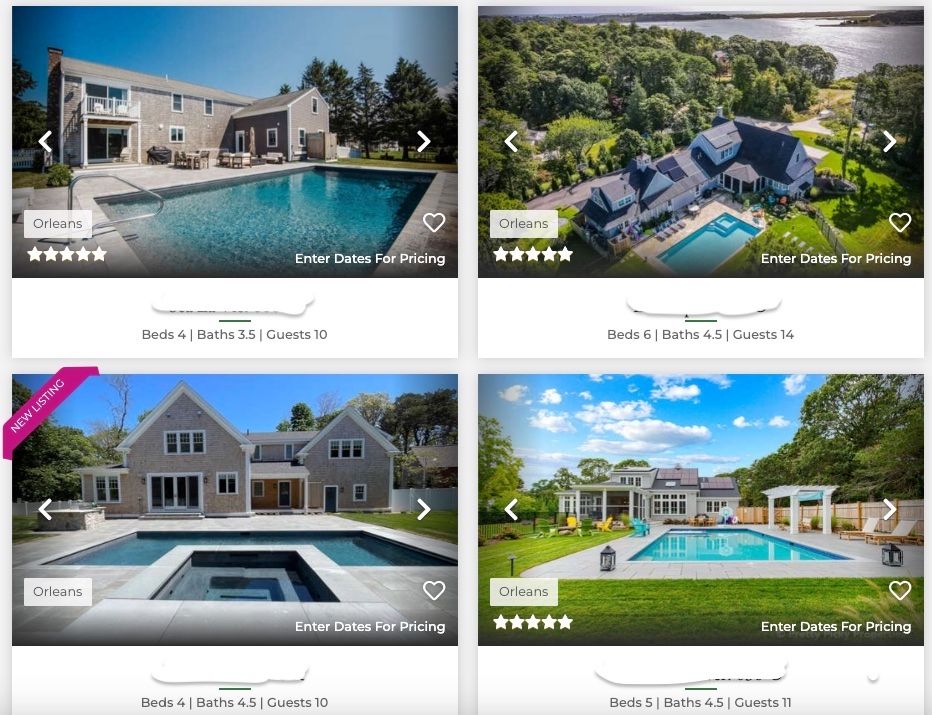
Consequences of Growth
Shoreline pathways that were once quiet — and largely unknown by visitors — are now heavily used. Some landings where parking was never a problem now have signs requiring beach stickers. From traffic in conservation areas to complaints about residential noise, an ever-increasing seasonal population brings some pain and requires adjustments.
These are small frustrations compared to the potential impact on our natural environment. Agencies and managers report that many renters increasingly seek out larger homes with high-end amenities — central air conditioning, manicured grounds, heated pools, linen service. In response, landlords are updating and upgrading, adding features that consume large amounts of energy and involve fertilizers and pollutants that end up in our waters.
Let's not forget the major burden all those extra humans in summertime — 15,000 visitors or more — place on septic systems, which also threaten our coastal waters and ponds. Pilgrim Lake, the largest freshwater pond in Orleans, covering 43 acres, has been closed since August 9 due to high levels of cyanobacteria caused in large part by leaching from residential septic systems around the lake, along with chemical lawn fertilizers.
Last week’s Boston Globe starkly described efforts to stave off an environmental disaster. “About 90 percent of the Cape’s estuaries — important for marine life and recreation — had unacceptable quality in 2022, according to a recent report from a local conservation organization. The main culprit: decades of nitrogen pollution, primarily from septic systems.”
The good news is that our new, modern, multimillion-dollar Wastewater Infrastructure is rolling out as planned. Phase 1, which created a sewer system for downtown Orleans, is complete. Properties in the downtown area are required to connect to the new sewers by March 2024 or incur daily fines. Construction of Phase 2, sewering the Meetinghouse Pond Area, began this month. (For up-to-date information on locations, construction details, and road detours for that work, click here.)
STRs Worsen the Orleans Housing Crisis
Housing in Orleans was already in short supply, especially for year-round families and the workforce. The exploding popularity and profitability of STRs has depleted it further.
“We are a resort town, we always have been,” Select Board Member Michael Herman says. He grew up as a “summer kid” here, his family renting small cottages, and later, working alongside college kids who paid the rent with money they made lifeguarding or working construction or waiting tables in town. “That doesn’t exist any more,” he says. “The problem is, the balance has shifted. Then, vacation rentals didn't have an impact on year-round rentals. Unfortunately, now they do.”
Year-round rentals are almost non-existent, and what is available tends to be exorbitantly expensive, totally out of reach for most. (See EXIT 89’s deep dive on the Orleans Housing Crisis, from September, 2021, for details.) Summer workers also struggle to find housing, contributing to already critical labor shortages across the Cape, and some would argue, empty storefronts.
“Our fastest growing demographic is between 25 and 54 years old,” says Hadley Luddy, CEO of Homeless Prevention Council. “Orleans is one of the highest-priced real estate markets on the Cape, and already unaffordable for most. We need all kinds of housing, but it’s our workforce and our employers who are the most impacted by the lack of year-round rentals. What was a very difficult situation is now impossible.”
Luddy wishes more people looking to rent out their homes would consider making them available year-round or offering them as winter rentals. There could be more help from the Town or State — incentives for landlords, such as a property tax reduction on year-round rental houses, and assistance programs for local workers. Despite having some of the highest rents on the Cape, Orleans is the only town from Dennis to Provincetown that does not offer rental assistance for residents.
Michael Herman says he’d like to see an analysis of the true costs and benefits — to homeowners, to the environment, to the Town — of renting out a home as an STR versus longer term. He asks, “What would it take to get some homes off of the STR market?”
Housing advocates say those in the STR business need to be part of the solution, and some are stepping up. Nauset Rental gives a percentage of guest bookings to local nonprofits like Housing Assistance Corporation. Luke Chapman, CEO of Del Mar Vacations, has helped employees purchase homes or paired them with homeowners willing to rent year-round. Del Mar has also partnered with the Cape Cod Baseball League to start Live and Work Cape Cod, a fund to support attainable housing on the Cape.
Jeff and Joan Talmadge of WeNeedaVacation say they didn’t truly understand the breadth and depth of the housing crisis until they began living here year-round, a year and a half ago. “Certainly we are part of the [affordability] problem,” Jeff says of the STR industry. “We spend a lot of time thinking about what we can do, how we can help.” They’ve started hosting Zoom gatherings of local activists and experts, and are actively working to educate their homeowners on the crisis.
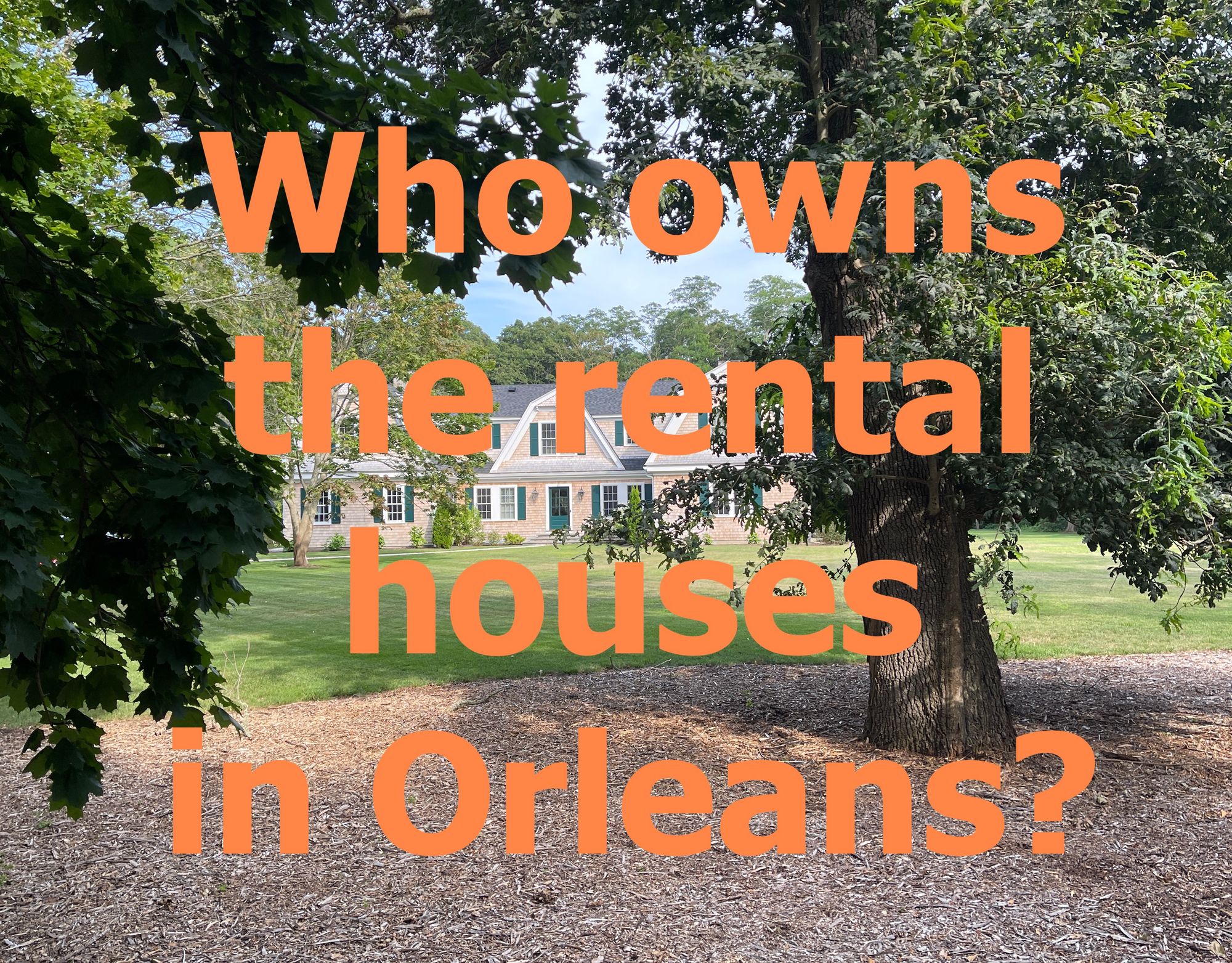
Corporate Landlords
Another unfortunate real estate trend, here on Cape Cod and around the country: private equity and other large investors operating as LLCs are scooping up properties, sometimes several in one town or area, and renting them out by the week or weekend — in some cases by the night — with no intention of using the homes themselves or setting foot on Cape Cod. Corporate landlords are proliferating in Massachusetts; Barnstable County has the most in the State. In Orleans, there’s currently no regulation requiring a local property manager for rentals, or even a contact number. Sometimes just an out-of-state corporation’s name is listed on the home’s deed. Problems can arise, especially when the home in question is 10,000 square feet.
“We are now in a mode of folks capitalizing on the beauty of the environment because they can afford it,” Galligan told the Cape Cod Times last year. “They get their pool, their fire pit, as much parking as they want and it goes up on Airbnb — sleeps 20 people, $4,000 a night and you’ve got a waterfront view.”
While it’s unclear how common remote and/or corporate ownership is in Orleans, it has led to a creeping sense of unease and distrust regarding STRs — with some full-time residents worrying that their growing number, especially the strictly investment properties, is compromising the fabric of life in Orleans. At Town Meeting in October 2022 and also this past May, residents described a sense of living in a commercial zone rather than a neighborhood. They mentioned increased noise, trash and parking issues — and wondered why homes being run purely as businesses are allowed to operate in residential zones at all.
What Will Our New Bylaw Do?
At this past May’s Town Meeting, Orleans voters approved a new bylaw requiring all landlords in Orleans to register with the town. (They are already required to register with the State.)
Proponents of the new bylaw believe it will provide a clearer picture of rental housing in town, encourage landlords to be transparent about their businesses, and make Orleans a safer place to rent. The tragic death of six-year-old Kyi Bourne in February — due to a fire in an overcrowded and illegally configured Orleans rental that lacked smoke and carbon monoxide detectors — convinced many voters to support the new law, a version of which failed to pass at the previous Town Meeting.
Our new registration bylaw was approved last week by the Massachusetts Attorney General. The Town Assessor's Office will begin taking applications, in-person and online, beginning January 1, 2024. (To see an explanation of the new registration program, go to page 106 of the Town Meeting Warrant, available here. For EXIT 89’s recap of the meeting, click here.)
There will be no fee to register, but landlords will be asked to provide contact information and attest to how many bedrooms, fire extinguishers and carbon monoxide monitors are in the home. (For more information about registering in Orleans, click here.) Violators — landlords who don’t register — will get a warning for the first offense, a $100 fine for the second, and a $200 fine for the third and subsequent offenses. Enforcement will be carried out by the Fire Chief or “the Fire Chief’s designee.”
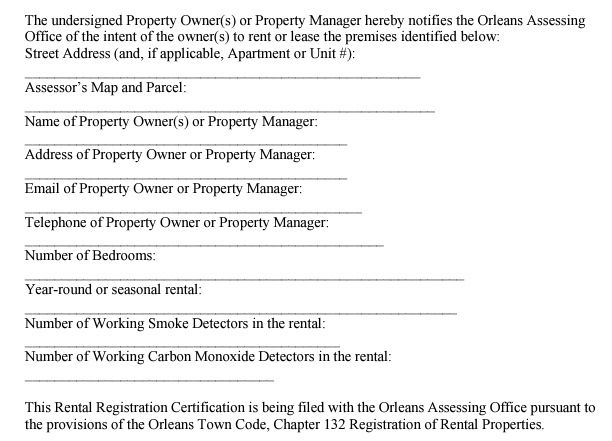
Worth knowing: Orleans is behind other Cape towns when it comes to regulating STRs. Most Cape towns have a rental registration program already, and charge an annual registration fee. Many towns are in the process of establishing more intense regulation and enforcement strategies — some of which fall to the Boards of Health rather than the Fire Departments.
In Falmouth, landlords pay a $25 registration fee. Dennis and Harwich charge $50, Eastham is $75 plus a $55-60 annual water test. Barnstable Village, West Barnstable, Marstons Mills, Cotuit, Osterville, Centerville, and Hyannis each charge an initial fee of $90 plus $25 for each additional unit. Truro’s fee is $200 per year.
Provincetown recently raised its annual fee for each rental property from $300 to $750 per year, and implemented a “Community Impact Fee” of three percent for owners renting out multiple units. (All Massachusetts towns have this option.) If you are wondering how rules in Orleans compare to other towns, you can find a comprehensive list of fees from around the region here.)
Eastham and Provincetown are leading the pack in oversight of STRs on the Outer Cape. Provincetown established a rental registration program in 2015. In Eastham, where registration and a registration fee have been in place for five years, all rentals require an in-person inspection by the Eastham Health Department to obtain a rental certificate, and another inspection every three to five years. Provincetown has contracted with a third-party vendor to help with enforcement of their extensive STR regulations, according to the Provincetown Independent, to be paid for by the anticipated $750,000 or more in projected total revenue from registration fees. Provincetown Board of Health Chair Susan Troyan has expressed hope that there will be enough revenue for routine health inspections too.
As Orleans debates exactly how closely to monitor its STRs, one thing that all parties seem aligned on is strict renter guidelines.
Luke Chapman, CEO of Del Mar Vacations, says good renter behavior is in everybody’s best interest and believes that landlords, not the town, should be the ones responsible for ensuring it. He advocates for “Good Neighbor Policies” — clear rules for tenants regarding occupancy, noise, parking, and age requirements, along with clear penalties, including eviction or fines, for breaking them — and local property managers, available around the clock, to implement them. Local property managers, Chapman says, are a must. Not only would requiring them employ more locals, it would ensure there’s always someone around to solve a problem.
Joan and Jeff Talmadge of WeNeedaVacation also believe that landlords need to make sure their renters are good neighbors. “If owners aren’t responsible, then there will be a backlash against them, and all of us,” says Jeff Talmadge — “and deservedly so.”
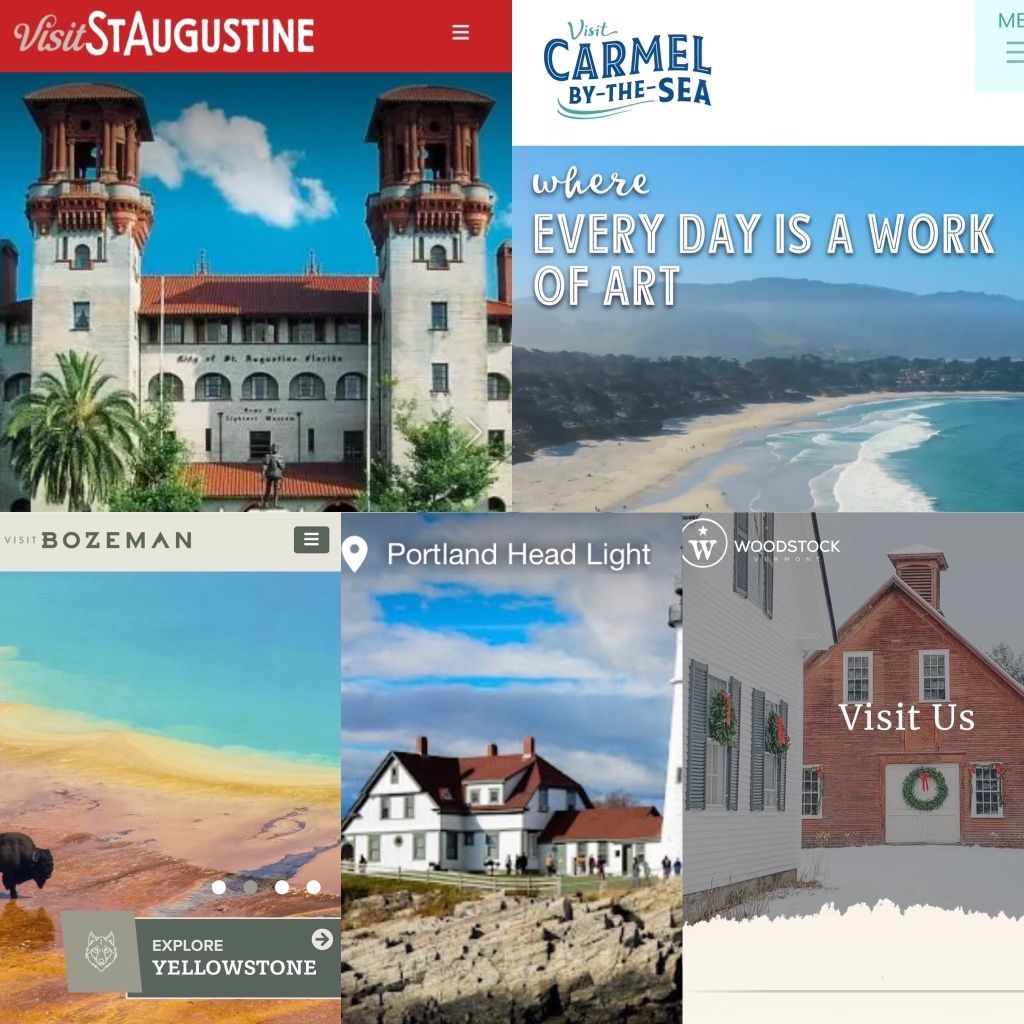
Ideas from Other Resort Towns
Orleans isn't alone in grappling with the success of its STR market. Some cities and towns around the country restrict the number of properties a single owner can lease out, or charge hefty fees for registering more than one property. Some towns cap the total number of days or times that a property can be rented out per year. Other towns distinguish between owner-occupied and non-owner occupied rentals, or cap the total number of STR permits issued in a year. Others require landlords to carry a certain amount of liability insurance. Still others completely ban STRs in certain zones of town — usually residential areas — while others have banned STRs altogether.
Here’s EXIT 89’s (highly unscientific yet we hope informative) sampling of how other vacation destinations are managing STRs:
● STRs on Nantucket could look very different next summer. Two new STR bylaws — one general and one relating to zoning — will be on Nantucket’s Special Town Meeting warrant in November. New regulations would include limiting properties that have been STRs before to nine rental contracts in the high season (July and August), and properties with no STR history to four contracts in the high season. The proposed general bylaw would also limit STR ownership to one per person, and ban corporate ownership for non-grandfathered properties. The proposed zoning bylaw would allow STRs in all zones on the island – but can only pass if the general bylaw passes. Stay tuned. Nantucket’s current registration program includes a $250 fee for each unit rented and a list of regulations. The island also has a Short-term Rentals Hotline for complaints.
● Great Barrington, Massachusetts, recently passed regulations restricting residents to listing only one short-term rental space and requiring all LLCs to disclose their financial backers.
● In Carmel-By-the Sea, California, “In order to preserve Carmel-by-the-Sea’s residential character,” those hoping to rent out their homes in the residential district for less than a month are 100 percent out of luck.
● Portland, Maine has different rules for owner-occupied and non-owner occupied STRs. That city’s annual fees for landlords start at $200 for an owner’s first rental, and go up to $4,000 for their fifth.
● In the village of Woodstock, Vermont, owners are not allowed to rent out their properties more than 6 times a year (with some exceptions). Owners pay a $75 filing fee, $125 safety inspection fee, and fines for violations.
● Woodstock, New York capped the total number of STR permits available in town, and implemented a moratorium on all STRs starting January 1, 2021, so they could study the issue. They’ve been granting a limited number of provisional STR permits to landlords while they try to come up with a plan.
● Bozeman, Montana has come up with a somewhat complex zone-based system to control the proliferation of STRs. In certain residential zones, the city completely prohibits STRs if an owner is not present. In others, STRs are allowed, but fees apply — some as high as $1,500 — depending on various factors. All Bozeman landlords pay a $250 registration fee and a $225 safety inspection fee.
● St. Augustine, Florida has established residential zones where rentals shorter than one week or one month are prohibited. All rentals must be registered and pay a registration fee of $294 or more, depending on the number of bedrooms. Florida lawmakers have introduced legislation that would weaken the ability of cities and counties to regulate short-term rentals (citing the rights of property owners), but have thus far been unsuccessful.
● Overseas? In Paris, STRs, or les locations de courte durée, are capped at 120 days a year, per property, with steep fines for landlords who break the rules. In London, the maximum is 90 days a year; and in Amsterdam it’s 60 days. Portugal has stopped issuing new licenses for short-term rentals, except in rural areas.
What makes sense for Orleans?
What do you think about STRs in Orleans?
Let our Select Board know.
EXIT 89 would like to thank Kevin Galligan, Michael Herman, Cathy Doane, Brad Hinote, George Meservey, Scott Walker at Town Hall, along with Luke Chapman, Vanessa Dolle, Hadley Luddy, Joan and Jeff Talmadge and Kent Zelle for their invaluable help with this issue.

EXIT 89 is an independent publication. Our mission is to help Orleans voters make sense of town issues by providing a clear and impartial overview of the latest developments. We want to help fill the current information gap, reduce the "mystery" of Town Meeting, and promote vibrant civic engagement.
Our hyperlocal digest is researched and written by journalists Martha Sherrill and Emily Miller. Elaine Baird and Lynn Bruneau are the founding advisors. Editing, infographics and tech support are provided by Kazmira Nedeau of Sea Howl Bookshop. We are all residents of Orleans.
Lower Cape TV, a 503(c)(3), is our fiscal sponsor. All contributions to EXIT 89 tax deductible.
If you are interested in joining our effort, please sign up for a free subscription or contact us at hello@exit89.org.

